On 24th and 25th June 2025, the National Renewable Energy Platform (NREP), in collaboration with the Solar-Electric Cooking (SOLCO) Partnership, participated in two key events in Bidi Bidi Refugee Settlement, Yumbe District.
The first day featured the World Refugee Day Celebrations in Zone 5 held under the theme “Solidarity with Refugees.” The event brought together leaders and members of refugee and, host communities, and other key stakeholders such as government, non-government organizations, and donor agencies to honor the resilience and contributions of displaced communities to Uganda’s economy. The event featured various cultural performances and inclusive dialogues on financial inclusion, community led innovation and collaborative partnerships to advance long-term development in refugee settings.
On the second day, the first Stakeholder Engagement on the Solar Electric Cooking Program in Displacement Settings for Bidibidi refugee settlement was held at the UNHCR Field Office in Zone 2. This event brought together private-sector innovators, NGOs and community members to unpack the dangers of traditional biomass use for cooking; demonstrate the capabilities of modern cooking technologies; and create awareness of the financing options available to the refugees to acquire the various sustainable clean cooking solutions.
Together, these events showcased the commitment to support displaced communities with clean, dignified clean cooking energy solutions that protect health, the environment, and long-term livelihoods.
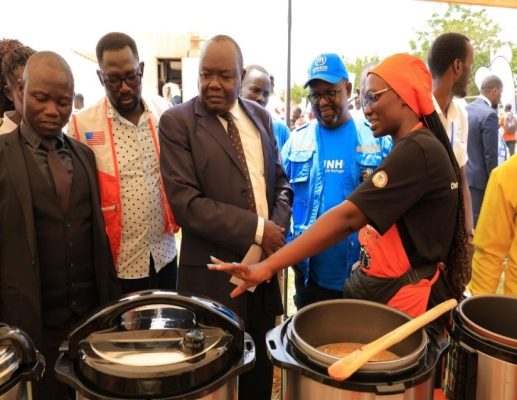
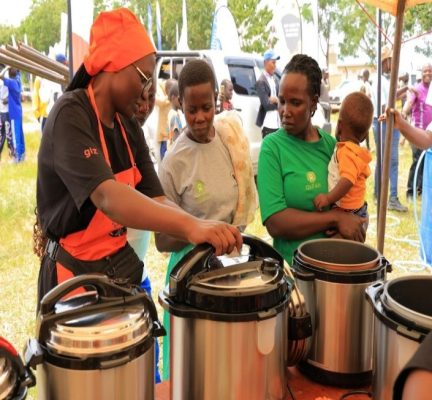
Ms. Eunice Orone from BSUL demonstrates the EPC to participants (Left) and Chief Guests (Right) at the World Refugee Day Celebrations.
Key Highlights and Observations
Day 1: Celebrating Resilience and Inclusion
Uganda’s internationally recognized open-border policy for refugees was commended by speakers from both development partners and refugee communities. They highlighted its role in preserving the hopes of displaced persons by granting freedom of movement, access to land, and services. Bidi Bidi Refugee Settlement, for instance, currently hosts over 208,000 refugees, reflecting the scale of Uganda’s commitment. The Government of Uganda was further praised for integrating refugees into national systems such as education, healthcare and employment. The support of agencies like UNHCR in this integration was underscored. Appreciation was also extended to host communities for opening their homes, sharing land, and supporting refugee livelihoods in efforts to ease the burden faced by displaced populations.
NREP held a joint exhibition with the SOLCO partnership, where a range of clean cooking technologies were showcased during the event, including solar and hybrid electric cookers, pellet stoves, solar-aided volcanic rock stoves, and improved charcoal stoves. To demonstrate their practicality and suitability for local cuisines, the team prepared dishes such as kalo, rice, and beef using electric pressure cookers. This hands-on demonstration highlighted the potential of these technologies as sustainable alternatives to firewood, which is becoming increasingly scarce in the settlements.
Day 2: Stakeholder Engagement on Solar Electric Cooking for Displacement Settings
The following day, attention shifted from celebration to action with a stakeholder engagement under the Solar Electric Cooking (SOLCO) Program in Zone 2.
Participants included district officials, NGOs, private companies, financing institutions and members of both refugee and host communities. Opportunities to accelerate clean cooking adoption were explored through exhibitions, hands-on demonstrations and open dialogue.
Technologies showcased included:
- Electric pressure cookers
- Solar and hybrid-electric pressure cookers
- Pellet stoves
- Volcanic rock stoves
- Improved charcoal stoves
These were demonstrated by private sector companies operating in the clean cooking sector such as WANA Energy Solutions, Eco Safi, Eko Pot, Biogas Solutions Uganda Limited, and Ebenezer Energy Saving Stoves Ltd.
Financing institutions present at the event, including FINCA International and Centenary Bank, introduced accessible loan products tailored to displaced persons. FINCA highlighted its Renewable Energy Loan, which is awarded to community-based groups without requiring collateral. Similarly, Centenary Bank unveiled loan products targeting women, persons with disabilities, and small business owners within the settlements. The speakers underscored that the loans carried low interest rates, with the only requirements being a national or refugee ID and a single passport photo.
The event also marked a notable shift in gender dynamics. Men enthusiastically joined cooking demonstrations, discovering clean cooking to be faster, safer, and more dignified. This inclusive participation portrayed an opportunity for breaking long-standing stereotypes around household roles.
Finally, officials from the Office of the Prime Minister and FAO emphasized the urgency of addressing deforestation, reinforcing clean cooking as a critical solution for both environmental protection and improved well-being. Overall, the event signaled growing momentum and commitment towards clean energy transitions in Uganda’s refugee settlements.
Insights from Stakeholders and Partners
Emmanuel E. Kakoro, Environment and Energy Officer at FAO, explained that the SOLCO initiative intends to reduce reliance on charcoal and firewood, which have led to significant forest loss. He also highlighted FAO’s efforts focused on restoring degraded ecosystems through the Eco Adapt partnership.
Dr. Nicholas Mukisa, Deputy National Coordinator at NREP, introduced the Behavior Change and Electric Cooking (BCCEC) Project funded by the UK Government. He encouraged early community engagement to help families shift toward clean cooking while saving money and preserving natural resources.
Kuol Arou Kuol, a refugee and Partnership Officer at Last Mile Climate, presented common misconceptions about affordability and willingness to pay for clean energy technologies among refugees. He noted that Last Mile Climate works with local partners like AYAN and CECI to bring energy solutions to last-mile consumers through interventions which address common misconceptions by refugee and host communities. He reaffirmed SOLCO’s target of transitioning 250,000 households to clean cooking by 2027 and emphasized the value of public-private partnerships to drive systemic change.
Christopher Angvalia and Hafizu Luwombo, Assistant Settlement Commanders at OPM, noted that the forest cover in Bidibidi had significantly declined since the settlement’s establishment in 2016. The leaders of the refugee and host communities welcomed the role of clean cooking in reducing environmental degradation and called for the creation of local distribution hubs for clean fuel. They also called for increased tree-planting efforts.
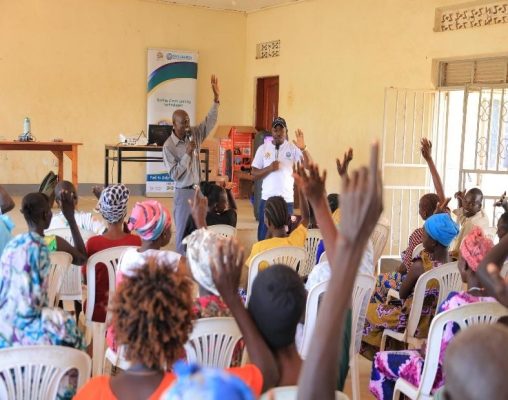
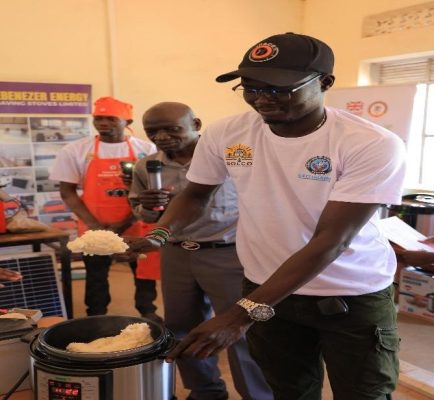
Left: Dr. Nicholas Mukisa engages Participants at the Stakeholder Engagement, Right: Kuol Arou Kuol demonstrates the preparation of posho in a solar powered electric pressure-cooking unit.
Key Challenges & Lessons Learned
Several key challenges were raised during the engagement such as:
- High upfront costs of clean cooking appliances.
- Limited electricity access, with approximately 89 percent of the settlement unconnected.
- Fuel availability for some of the technologies such as pellets and volcanic rocks.
These concerns underscore the need for targeted financing, subsidies, and integration with energy access initiatives. The participation of financing institutions and the display of diverse technologies highlighted a growing ecosystem of support and innovation for energy transitions in refugee contexts.
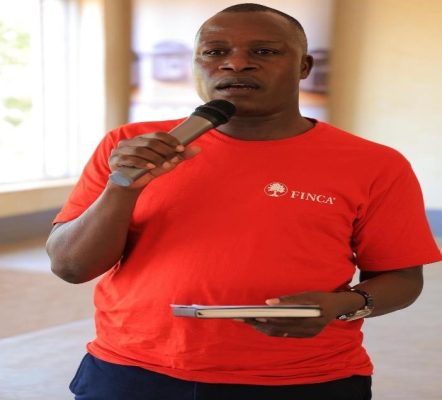
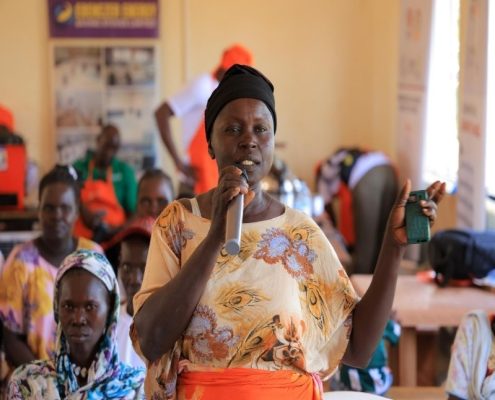
Left: A representative from Finca presents various loan options available to members of the refugee community. Right: A member of the refugee community inquiries about the terms and conditions of the various loan options.
Conclusion & Next Steps
The National Refugee Day celebrations and the SOLCO stakeholder engagement events in Bidibidi affirmed the capacity and commitment of refugee communities to lead in the clean energy transition. NREP in collaboration with partners, including refugee led organizations (RLOs) will continue working to ensure clean cooking technologies and fuels reach refugee and host community households. A follow-up event has been planned later in the year to build the capacity of the refugee led organizations to enhance uptake of clean cooking solutions.


